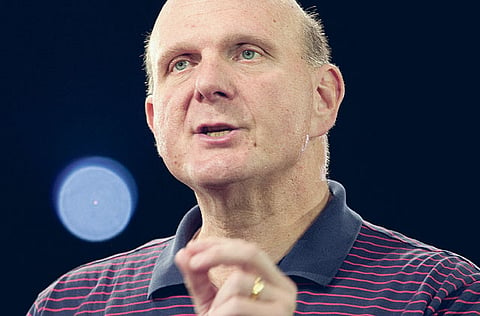Hedge funds swoop on Microsoft
Stock is now trading at around 10 times expected earnings for the next 12 months

Seattle: Top hedge fund managers such as Dinakar Singh and David Einhorn scooped up Microsoft Corp shares in the second quarter, taking advantage of historically low price-to-earnings multiples for the world's largest software company.
Microsoft — whose systems run more than 90 per cent of the world's personal computers — saw its shares fall sharply last quarter, even as Wall Street analysts forecast rising profits in the year ahead. The decline means the stock is now trading around 10 times expected earnings for the next 12 months, close to its lowest multiple on record and a 70 per cent discount to peers, according to StarMine data. And taking into account Microsoft's $37 billion (Dh136 billion) of cash, the true multiple is more like eight, some investors said.
"That's insanely cheap for a company of this calibre and market position," said Whitney Tilson, managing partner of T2 Partners LLC and the Tilson Mutual Funds, who bought Microsoft shares in the second quarter.
Opportunistic
While most investors seem to have concluded that the growth days of the stock are over, a growing faction of savvy hedge funds — including Singh's TPG Axon, Einhorn's Greenlight Capital, John Griffin's Blue Ridge and Thomas Claugus's GMT Capital — see an undervalued opportunity in the huge and increasing profits delivered by the Windows 7 operating system and Office franchise.
Interest from such fund managers helped make Microsoft one of the largest additions in the second quarter Smart Money survey, compiled by Thomson Reuters, of the portfolios of 30 of the biggest fundamentally-oriented hedge funds.
The Redmond, Washington-based company took a hit to its prestige in May when old rival Apple Inc surged past it in market value. Apple is much less profitable than Microsoft, but it is rewarded with a higher multiple by investors excited by a stream of innovative products like the iPhone and iPad.
A lot of Microsoft's value is overlooked in comparison, said Patrick Becker Jr at Becker Capital Management, also a holder of the stock. "It's a perception issue with them [Microsoft]. For whatever reason, if you do well with the consumer, you get a higher multiple on your stock," he said.
"Microsoft doesn't get very much credit for what they do on the business side and the dominant share they have there."
But some Microsoft problems are more than perception. Despite its seemingly unassailable dominance in the business software sector, some investors worry the company has no response to the iPad, which threatens to wean consumers off netbooks and may work its way into corporate life.
Its new phone software — due to debut in the next few months — needs to make up a lot of lost ground, and its money-losing Bing search engine has not made any great inroads on Google.
Doubts
The stock is suffering under the weight of those doubts, some investors say, falling 21 per cent in the second quarter, compared to a 12 per cent fall in the Standard & Poor's 500 index. Some hedge funds, including Appaloosa Management, Chilton Investment Co and Pennant Capital Management, took the opportunity to trim their holdings in Microsoft last quarter.
"Tablets — the iPad in particular — and the smartphone market are major overhangs and discounted heavily in the stock," said Ken Allen at Baltimore-based portfolio manager T. Rowe Price, whose Science and Technology Fund has Microsoft as a major holding.
The consensus view appears to be that Microsoft is now more of a value investment than a growth opportunity. The company has played its part in that, introducing a dividend in 2003 and paying a special dividend of $3 per share the following year. It is expected to increase its quarterly dividend next month from the 13 cents per share it has paid out for the last eight quarters.
"There's a record of them returning excess cash to shareholders," said Becker. "I don't think you'll see a special [dividend] out of them, but they will continue to raise the regular dividend and do share buybacks."
Microsoft's value momentum — which can signal that a stock may soon revert to historical valuation levels — is now greater than 83 per cent of US companies.



